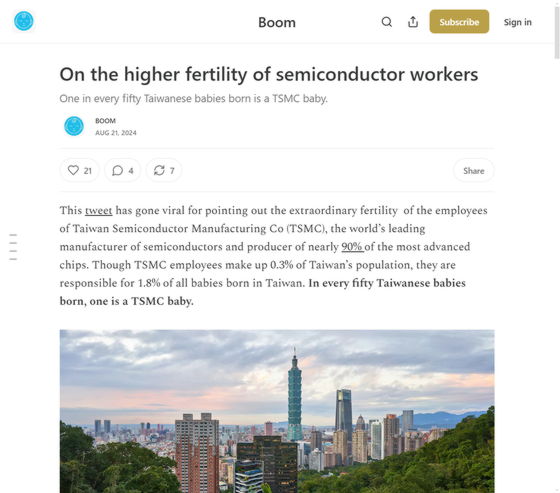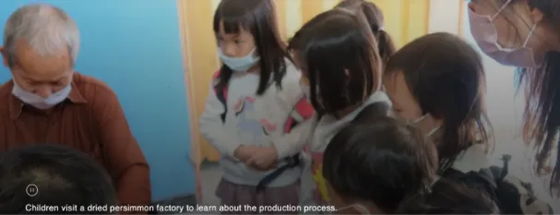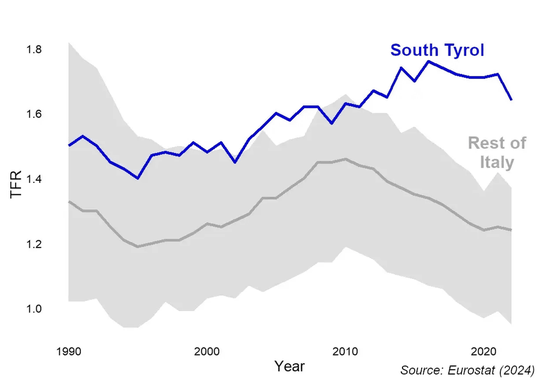It is revealed that one in 50 babies born in Taiwan is a 'TSMC baby' and the birth rate is unusually high only for TSMC employees

On the higher fertility of semiconductor workers - Boom
https://www.boomcampaign.org/p/on-the-higher-fertility-of-semiconductor

TSMC employee newborns in Taiwan make up 1.8% of country's 2023 total - Focus Taiwan
https://focustaiwan.tw/society/202403290012
Taiwan has one of the lowest birth rates in the world, with a total fertility rate of 0.87, which is an indicator of the number of children born to one woman. In response, TSMC announced in March 2024 that the number of newborns born to TSMC employees in 2023 accounted for 1.8% of the total number of newborns in Taiwan. This figure indicates that one in 50 newborns born in Taiwan are the children of TSMC employees, and has attracted attention as the birth rate of TSMC employees is extremely high.
One of the reasons why TSMC employees are giving birth to so many children is the ' TSMC Childcare Benefit Program 2.0, ' a program the company offers to create a family-friendly workplace. The program provides childcare services for employees with children, allowing them to be looked after from 7:00 to 20:00. In addition, each of TSMC's four campuses also has a kindergarten for preschool children aged 2 to 6.
Other curriculum offerings include immersive food and agriculture education, and even a half-day science camp for children on weekends, where employees' children can learn how to make kumquat tea and visit a dried persimmon factory.

Parents are offered flexible shifts, lactation rooms are available for breastfeeding or pumping, and pregnant women are given 12 weeks of maternity leave for their first child, 16 weeks for their second child, and 20 weeks for their third child.
TSMC Childcare Benefit Program 2.0 has the effect of promoting births, claims child-related information site
TSMC employees have access to free, high-quality childcare services right near their workplaces, and the company is supportive of employees having children, regularly communicating to employees that 'becoming a parent will not negatively impact your career.'
A recent study conducted in Italy has revealed that teenagers are influenced by the fertility of their colleagues at work, and a 1 percentage point decrease in the average fertility of colleagues has a negative impact of decreasing the probability of an individual having children by 0.3 to 0.4 percentage points. It has also been pointed out that TSMC encourages more employees to become parents, and that many employees are actually having children, so there is a positive transmission effect of having children among employees.
'Just seeing colleagues juggling work and child-rearing creates a positive impact among employees. Showing colleagues that having children is achievable and positive helps encourage them to have children. In other words, TSMC's parenting encouragement policy has helped foster a spontaneous parenting culture,' Boom noted.
In addition, South Tyrol in Italy has had a similar practical, child-rearing-friendly policy in place for about 30 years, providing a functional, affordable, and accessible child-rearing system, including public transportation and supermarket perks for families. The graph below compares the total fertility rate (TFR) of South Tyrol with other Italian regions. Boom pointed out that South Tyrol has a long history of child-rearing-friendly policies, which has led to a higher birth rate than other regions, and that this is because the same 'soil for voluntary child-rearing culture' as TSMC has been formed.

Demographer Lyman Stone points out that, globally, social status is positively correlated with men's likelihood of becoming parents, and in Nordic countries, less educated men are more likely to not have children.
We also know that personal economic instability lowers birth rates, while economic stability increases birth rates. TSMC employees have socially useful and high-paying jobs, and their social status and income are higher than that of ordinary Taiwanese, making it easier for them to start a family and have a partner. Therefore, it is quite possible that being a TSMC employee is related to the higher birth rate.
In addition, Hsinchu Science Park in Hsinchu City, where TSMC's headquarters are located, is known as Taiwan's Silicon Valley, has the highest average household income in Taiwan, and is also known as the area where the baby boom is occurring. Hsinchu County, where Hsinchu City is located, is the only county in Taiwan where the population under 14 years old exceeds the population over 65 years old, and 90% of the residents work in Hsinchu Science Park, with the population under 14 years old accounting for 29% of the population. In addition, the population under 14 years old in Taiwan as a whole is only 11.9% of the total population.
TSMC does not disclose the total fertility rate of its employees. However, the child support rate in Hsinchu County, where TSMC's headquarters is located, is the highest in Taiwan at 27.7%, far exceeding the 16.4% in Taipei City, Taiwan's capital, and the 19.7% in New Taipei City.
Related Posts:
in Note, Posted by logu_ii






